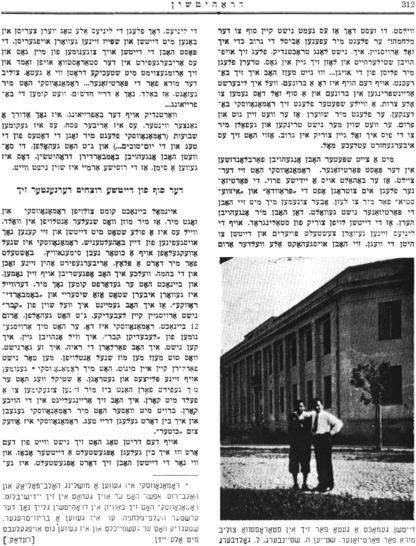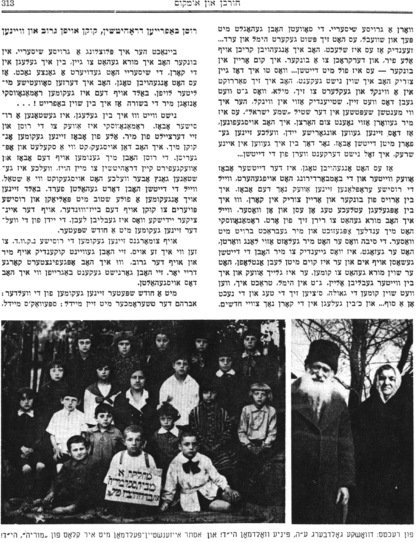
[Page 312]
[photo:] Germans built a ghetto for themselves in the municipal building because of fear of the partisans. Standing: H. Steinberg and L. Goldberg.
You can see that there's no end to the war!” He would open my pit a little so I could come out. Without giving it much thought, I would quietly come up and go out into the street. My eyes would fill with tears – where should I go? There was a well in the courtyard; I thought about simply jumping into it and ending all my suffering. A while later Romanovski would think things over, and would swear to me that he would behave himself and act properly. He said he wouldn't drink anymore, fell at my feet to beg me to return to the pit. This scene repeated itself several times.
Some time later some partisans wandered into the post office. Romanovski told them that he was hiding a Jewish woman. The partisans would frequently give him the Russian communist newspapers Pravda and Izvetsia for me to read, but the partisans didn't want me to join them. We then started to hear that the Germans were retreating from Stalingrad. Peasants and Germans were stationed at the rail lines to protect the roads. They chopped down all the forests around the lines, and every day the lines were torn up, and trains carrying Germans and food were blown up. The Germans moved the post office from my street to the municipal building on Sand Street, surrounding it with barbed wire like a ghetto because of their fear of the partisans. Romanovski told me that liberation was only three months away.
While we waited for liberation, winter arrived. Passover came and went, and so did the festival of Shavuot (Romanovski used to tell me the dates of the holidays), and thank G-d, the Soviets started bombing Drohitchin. This was a sign that the Russian army was close by.
The end of the German murderers approaches
On night Romanovski ran over to me and told me that we had to escape to the forest because the town was full of Germans and they could discover my hiding place. Romanovski quickly made off for a hamlet near Simenovitz and prepared a place there for me. He took his belongings and the animal that I had signed over to him. At night he had to come back for me. In the meantime there was shooting and bombing in town, and I was sure I wouldn't leave my “grave” alive. G-d was there to help, and at approximately 12 midnight Romanovski arrived and took me out of my living grave. I started to walk but couldn't. I couldn't see anything, I was blind. What should I do? We had to leave quickly, and we didn't have a minute to spare. Romanovski* put me on his shoulders and carried me He took me a short distance until we arrived in a wheat field. I hid among the tall wheat stocks, and Romanovski brought me bread and water. I stayed there for three days. Romanovski left for the hamlet.
On the third day, not far from my new hiding place, a German transport came by and stopped there. As soon as it stopped, shooting broke out.
* Romanovski was half Pole and half Russian. It's possible he also had some Jewish blood. He came to Drohitchin right after World War I and worked as a mailman. He always smile and was on good terms will all Jews. [Editor]

[Page 313]
[photos:] From right: Dvoshka Goldberg, Pinya Waldman. May G-d avenge their blood!
Esther Eisenstein-Feldman and her Moriah School class. May G-d
avenge their blood! [sign held by child: Grade 1, Moriah School, Drohitchin,
Polesia]
The Soviets struck with pitch and sulfur, shaking heaven and earth. When I saw how bad it was, I started crawling to the bunker on all four. When I got there it was full of Germans. What was I doing there? I couldn't go back, so I moved into a corner and told myself that everything was up to G-d. As I stood in the corner I heard people whispering “Hear O Israel.” It was so close to my heart, and then I found out that these were Hungarian Jews who had traveled with the German transport. I was just so scared of being identified by the Germans.
Daybreak was approaching, and the German transport was stopped again because of the bombing stopped and the Russian airplanes went after the transport. I left the bunker and went back into the wheat field where I spent a few days without food or water because I was scared to move from my spot. Romanovski finally found me and brought me bread and water. The reason why he let me wait so long, he said, was that on his way to me the Germans shot at him and he barely got away alive. So he was scared to come. He left me right away and I was alone again. I was asking G-d when the redemption would come – days and nights passed without end, and I remained in the wheat field for another two months.
Russians liberate Drohitchin, look at the pit and cry
At night I suddenly heard loud shooting. I was scared to go into the bunker, and remained in the field. The shooting lasted all night. When daylight arrived I noticed Soviet soldiers running, and soon Romanovski came to tell me that news that I was now free!
There was a Russian transport not far from where I was lying. Romanovski went to the Russians and told them about me. All the soldiers in the transport came to look at me. I looked like a skeleton and broken apart. The Russians took me onto the transport and took me to my home in Drohitchin. My house was undamaged, but it looked like a horse stable because the Germans kept horses there. Soon a large contingent of Poles and Russians came to look at the amazing sight of the only Jewish woman who remained alive. The Jews in the forests arrived only a month later.
The next morning the Russian NKVD arrived to see how I looked. They started crying when they looked at me and at the pit where I lived for three years in darkness. They couldn't imagine how I survived. A month later the following arrived from the forest: Avraham of Tcheromcha and his daughter; Spevack's young daughter, Nachum
Previous Page |
Next Page
JewishGen, Inc. makes no representations regarding the accuracy of
the translation. The reader may wish to refer to the original material
for verification.
JewishGen is not responsible for inaccuracies or omissions in the original work and cannot rewrite or edit the text to correct inaccuracies and/or omissions.
Our mission is to produce a translation of the original work and we cannot verify the accuracy of statements or alter facts cited.
 Drogichin, Belarus
Drogichin, Belarus
 Yizkor Book Project
Yizkor Book Project
 JewishGen Home Page
JewishGen Home Page
Copyright © 1999-2025 by JewishGen, Inc.
Updated 13 Dec 2001 by LA